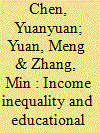|
|
|
Sort Order |
|
|
|
Items / Page
|
|
|
|
|
|
|
| Srl | Item |
| 1 |
ID:
192353


|
|
|
|
|
| Summary/Abstract |
Using China Family Panel Studies data, we analyze online and offline social interactions' influence on household entrepreneurial choice. We conclude that social interactions can positively influence household entrepreneurial choice, intensity and performance, and our findings are robust considering the possible endogeneity problem. The mechanisms of information acquisition, financing constraints relaxing and relative wealth concern are valid. In terms of heterogeneity analysis, for entrepreneurs of rural migrant backgrounds (those with agricultural hukou and urban permanent residence), the impact of online social interaction is more significant than it is for others. For households in the eastern regions, social interactions show significant positive impacts on entrepreneurship choices. We also find that the promotion effect of social interactions is more pronounced for households with a higher debt level than for those with a lower debt level.
|
|
|
|
|
|
|
|
|
|
|
|
|
|
|
|
| 2 |
ID:
192393


|
|
|
|
|
| Summary/Abstract |
Using the data from the China Family Panel Studies from 2010 to 2018, we find that rising income inequality causes parents to spend more on children’s education, both in school and out of school. The impact of income inequality on out-of-school expenditures is significant at intensive and extensive margins, especially for study-related tutoring participation. Furthermore, we find some empirical evidence suggesting that in response to rising inequality, mothers spend more time on children’s education and there exists a substitution effect between time and money. Further analysis suggests two potential reasons for the rising education spending: (1) a higher income inequality resulting from rising skill premium strengthens parents’ long-lasting cultural attitude towards education to higher levels, inducing them to spend more on educational investment, and (2) a higher income inequality increases the value of higher education, leading to a stronger demand for better educational opportunities, and then, more intense education competition, forcing parents to invest more in education.
|
|
|
|
|
|
|
|
|
|
|
|
|
|
|
|
| 3 |
ID:
187804


|
|
|
|
|
| Summary/Abstract |
This study investigates the effect of grandparental involvement in childcare on children's locus of control (LOC), which is an important non-cognitive skill that affects children's future development. We use data from the China Family Panel Studies, which is a nationally representative survey, and employ instrumental variables to address the endogeneity of family childcare choice. We find that children with grandparental care have more external LOC than children in the sole care of their parents do; that is, they are more likely to attribute individual success to external factors, such as luck, fate, and family background. This finding is robust to different measures of grandparental involvement in childcare and different model specifications, as well as a minor violation of the exclusion restriction of the instruments. We further examine the potential mechanisms underlying this effect. Grandparents have more external LOC than parents do, which can affect children's LOC through intergenerational transmission of LOC. Their parenting attitudes and styles are also different from parents' in that grandparents take less responsibility for children's academic performance than parents do and are less strict with children. In addition, grandparental care induces adverse effects on children's family environment.
|
|
|
|
|
|
|
|
|
|
|
|
|
|
|
|
|
|
|
|
|